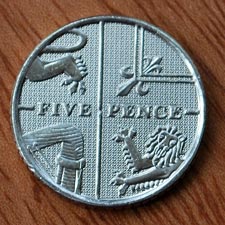
With the Budget creating a universal hum of disapproval, and just this week HMRC admitting that around 6 million taxpayers have been affected by an internal error, it seems as if the decision makers pulling England’s strings can barely do a thing right.
Well now another monetary decision has been slammed, but this time we’re talking pocket change, namely five and ten pence pieces.
Next year will see the introduction of new, considerably different, 5p and 10p coins, and experts fear that the drastic changes will cause chaos for people who try to use them in vending machines.
The problems lie in the metal used to make the new coins, current coins are made from a metal called cupronickel, which is an alloy of copper and nickel. The new coins are to be made of steel, will be thicker, and will be magnetic.
The change has come as a cost cutting measure, by changing to steel the Government aims to save around £8 million per year, as the price of copper has skyrocketed in recent times.
However the Royal Mint seems to have ignored the fact that the change, whilst saving them money, could devastate vendors around the nation. Jonathan Hilder, the chief executive of the Automatic Vending Machine Association, claims that his pleas have fallen on deaf ears: “We've told the Treasury and The Royal Mint that this is going to be a disaster, but they haven't taken notice. It's meant to be a money saving exercise, but this will cost the vending industry £42 million and the coin machine industry as a whole possibly as much as £100 million.”
The issues will come about as the new coins will clash with the highly sophisticated anti-fraud systems that are hidden in most vending machines. The machines have software that analyses the weight, shape and electromagnetic properties of the coins, and when the new coins come into circulation, costly changes will have to be made.
Another problems lies in the fact that the exact make-up of the coins is yet to be finalised, sample coins have been sent to vendors but until a definite coin is established vendors will not be able to alter their software.
A spokesman at the Treasury simply said: “The proposal to make new 5p and 10p coins out of nickel-plated steel rather than a cupronickel alloy is one of many measures being considered by the Government with a view to reducing the fiscal deficit.”

